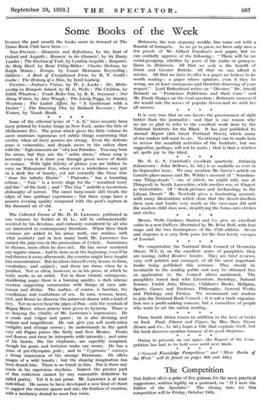The Collected Poems of Mr. D. H. Lawrence, published in
two volumes by Seeker at £1 ls., will be enthusiastically received by his devotees, and curiously considered by all who are interested in contemporary literature. When these thick volumes are added to his prose work, one realizes with what assiduity and in how many lands Mr. Lawrence has carried the pine-tree in the processions of Cybele. Sometimes he rhymes, more Often he does not. He has never mastered any regular stanza ; had he done so at the beginning, even if he had thrown it away afterwards, the exercise might have taught him concentration. But he allows himself every licence in form, vocabulary, and subject ; and there are times when he is justified. Not so often, however, as in his prose, at which he really works as an artist. Yet in these violent, outrageous, shuddering pages there is a burning quality, a dark intense emotion suggesting communion with things at once sub- human and divine. The matter, of course, is familiar, the crucifixions and exaltations of sex. In man, woman, beast, bird, and flower he discerns the primeval drama with a kind of fury. Yet we never hear the pipes of Pan—only the cymbals of Magna Mater, whose priests were given to hysteria. There is no denying the vitality of Mr. Lawrence's impressions. He is crude and vulgar and queer ; he is also divining and radiant and magnificent. He can give you soft moth-eaten twilights and strange moons ; he understands to the quick very old Pagan places like Sicily and New Mexico. Fruits and flowers and trees he interprets with intensity ; and some of his beasts, like the elephants, are superbly imagined, though his goats and tortoises make one weary. He has a sense of pre-Olympian gods ; and in " Cypresses " conveys a living impression of- the strange Etruscans. He offers images of a wild beauty ; but the shaping imagination has been denied him. There is no Greek in him. Nor is there any music in his capricious rhythms. Indeed, the greater part of this Collection cannot by any reasonable definition be called poetry. Yet it is not prose. Mr. Lawrence is at least individual. He seems to have developed a new kind of chant to suggest the obscure spasm and stir, the fruition of creation, with a lambency denied to most free verse.




































 Previous page
Previous page